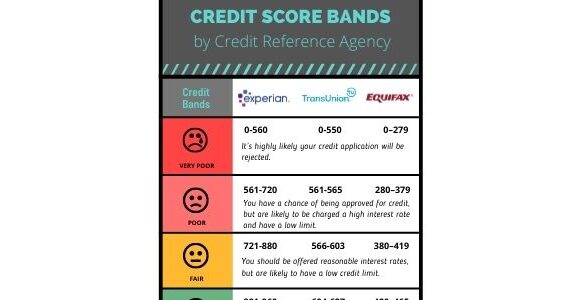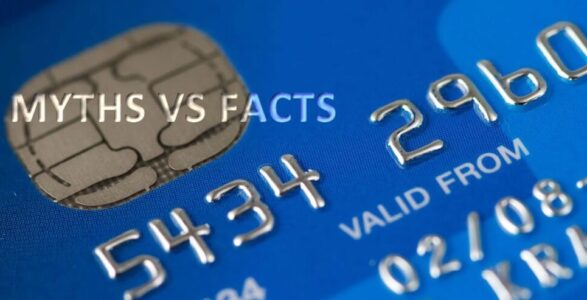How to Improve Your Credit Score?

9 April 2019
When applying for a financial product such as a credit card or loan the lending company will use your credit score to help decide whether to lend to you. The higher your credit score the better your chances of getting approved. A high score indicates you have a history of managing your credit well and making repayments on time. So it’s a good idea to try to improve your credit score.
The benefits of improving your score can include:
Access to more products.
Having a higher credit score improves your chances of getting approved; so you may have more choice of products and providers.
Higher credit limits.
Improving your credit score, also increases the amount companies will let you borrow.
Lower interest rates.
Companies will see your application as lower risk if you have a higher credit score. So they will offer you the best or lowest interest rates making borrowing money cheaper.
How is my credit score calculated?
In the UK your credit score is calculated by 3 credit reference agencies (CRAs). Experian, Equifax and TransUnion.
Each CRA may hold slightly different information and has it’s own way of calculating your credit score; so you will have 3 different credit scores.
The credit score ranges for the CRAs are as follows:
0-999 with Experian
0-1000 with Equifax.
0-710 with TransUnion
Ways You Can Improve Your Credit Score
Register on the Electoral Roll
You can prove where you live by being registered on the electoral roll at your current address. You can register no matter where you live – it doesn’t matter if you own your own home, rent, or live with your parents. Being on the electoral roll will boost your chances of getting credit. CRAs can verify who you are which will make you appear more stable to lenders. If you aren’t sure if you are registered or not simply check with your Local Authority. If you’re not sure if you’re registered, you’ll need to check with your local electoral registration office.
Use Credit Cards Little and Often
Using credit regularly but responsibly is key to building your credit score. Keep your credit card active by spending small amounts on it but paying it off in full each month. Lenders can see that you are responsible in managing your borrowing.
Pay Bills and Accounts on Time
By paying all your bills on time each month (utilities, credit cards, mobile etc) indicates to lenders that you are reliable and able to manage your finances well. Paying on time will help your credit rating and improve your chances of getting credit when you need it.
Get Your Name on Bills
It is difficult for lenders to assess you if you have no or little credit history. It is most common for young people. Utility bills count as a form of credit; so by having your name on the account for the gas or electric and paying the bill each month you build your credit score. If your name isn’t on the bill (for instance if you are in a house share) you won’t get the boost to your credit score even though you are contributing to the bills. Try and get at least one or two bills in your name.
Check for Mistakes
Your credit score is based on the information held in your credit report. So it’s important to make sure all the information held on you is correct. A mistake such as an error with your address or an account appearing as ‘open’ when it’s ‘closed’ can impact your credit score. So check your credit files frequently, and report any mistakes immediately to the relevant Credit reference agency.
Check for Fraudulent Activity
Keep a regular check on your credit reports so you can spot any potential fraudulent activity quickly. For instance if someone is trying to take out credit in your name you will see signs of this in the ‘searches’ section of the credit report. If you do spot anything notify the CRA, the Lender and Action Fraud. Note that if you do become a victim of fraud, your lenders should fix any damage to your score quickly.
Check if You’re Linked to Another Person
If you have any joint accounts you will be co-scored. If the person you are linked to has a bad score it could affect your rating. If you had a joint account but it’s now closed, make sure it shows as closed on your credit reports. If a closed account appears ‘open’ inform the Credit reference agency.
Pay off Existing Debt
Ideally you should pay off outstanding debt before applying for new credit. This is because banks, building societies and credit card companies might be hesitant about lending you more if you already have a lot of existing debt.
Don’t Use All of Your Available Credit
Keep your credit card utilisation under 30%. Credit card utilisation is the percentage you’ve used of your credit limit. If your credit card has a limit of £3000 and you use £1500, your credit utilisation is 50%. Keeping your credit utilisation low shows lenders you can manage your credit.
Limit Credit Applications
Every time you make an application for credit, a ‘hard search’ is carried out on your account and a mark is left on your credit report. It doesn’t matter what form of credit you apply for, or how much you’re asking to borrow – each application will record a hard search on your report which companies can see.
Applying for credit frequently in a short space of time can make lenders think you’re overly reliant on credit and therefore a higher risk; this could negatively impact your credit score. So try to space out any credit applications – for example no more than one every three months. Before you do apply, check your credit report information is accurate to boost your chances of success.
Use Eligibility Checker
Avoid getting rejected for credit by using an eligibility check or a ‘soft search’ before you apply. This means lenders can see some information about your credit history, but it won’t affect your credit score (only you can see if a soft search has been carried out on your account).
Eligibility checks show you how likely you are to be accepted for credit before you apply. This means you can avoid applying for products you’re unlikely to get, and (in theory) you won’t have to make multiple applications before you’re successful.
ClearScore’s ‘Offers’ section shows you financial products alongside your eligibility percentage (e.g. 90%). Many credit card providers also offer eligibility checks, which use a soft search to check your likelihood of acceptance. You’re the only one who can see your soft searches, and they don’t affect your score.
Close unused accounts
Lenders may be reluctant to give you more credit if you have available credit on unused accounts. So before applying for new credit close down dormant credit accounts.
Don’t change address frequently
Lenders will feel more secure if you can show you have lived at your current address for a considerable time.
Borrow What You Can Afford to Repay
Missing payments can get you into bad credit, and lead to things like County Court Judgements (CCJ), an Individual Voluntary Agreements (IVA) or even bankruptcy. These stay on your credit report for up to six years and will significantly damage your credit score.
Monitor Your Credit Reports
It’s worth checking in with all 3 companies to get a good overall view of your finances; it’s easy and it’s free.
ClearScore shows you your Equifax credit score and report, completely for free.
TransUnion’s data can be accessed with a free service called Credit Karma
Experian’s data can be accessed for free directly
Compass Vehicle Services Ltd offer:
nationwide car leasing – bad credit car finance – used car deals – personal leasing – business car leasing – best car lease deals – non-status car leasing
Back to all help and advice articles



